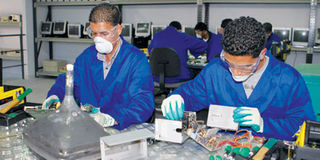Computer hardware helping young people stay on track

About 60 young people are learning computer maintenance, soft skills and entrepreneurship sponsored by Al Jisr in Casablanca while below, part of electronic waste that was accumulating in Al Jisr centre. Courtesy photo
What you need to know:
Teaching computer maintenance to school dropouts can give them a fresh start in life. An educational programme run by the Moroccan Non Governmental Organisation Al Jisr also allows for the recycling of up to 200 tonnes of electronic waste and helps equip state schools with computers.
L’Economiste Morocco
One-quarter of Moroccans between the ages of 15 and 24 are so-called “NEETs”: not in education, employment or training. Idle and excluded, these individuals number 1.7 million in all. The situation is a ticking time-bomb in Moroccan society.
Becoming a NEET often starts with underperforming academically or dropping out of school. Each year, state schools lose between 250,000 and 350,000 students (315,273 in 2018). With few qualifications, these youth go from one low-paid, unstable job to another, or just stop working altogether.
Al Jisr is familiar with this category of young person: unmotivated and lost. The NGO’s mission is to teach these people a trade and help them develop soft skills that will ease them into the job market. Around 10 years ago, Al Jisr launched the Green Chip initiative, in collaboration with several partners, including the Middle East Partnership Initiative (MEPI), an American grant-funding mechanism. The programme enables young people to learn about hardware by taking apart old computers.
Every year, the NGO collects used computers and other IT equipment from dozens of companies and public offices. The recovered material ends up at Al Jisr’s two training centres in Casablanca and Oujda. Young interns repair serviceable computers, which are donated to state schools. The others are dismantled and sent to the Moroccan mining giant Managem, a project partner, who extracts the minerals within.
Al Jisr recovers 150 to 200 tonnes of electronic waste each year, using it to achieve three goals: teach young people a trade, recycle electronic waste, and supply state schools with IT equipment, thus reducing the digital divide in the education sector.
The one-year course, which includes a three-month internship, is 80 percent hands-on. Graduates receive an “IT maintenance agent” diploma and a “dismantlement agent” certificate. Students receive a monthly stipend of 1,000 Moroccan dirhams (about $100 or Shs360,000) in Casablanca, or 500 dirhams in Oujda. This income motivates them to follow the course through to the end. The trainees also attend language and communications classes, as well as workshops in the arts, entrepreneurship and job-hunting skills. At the end of the programme, Al Jisr helps them to find jobs.
The efforts
“Their employment uptake rate is around 60 per cent. It is a decent performance,” Mohamed Lahlou, the association’s president, said.
“This year, we have set up a whole work team tasked with helping them break into the labour market faster,” the managing director, Wafa Berny, added. At the same time, the NGO is scaling up – it recently increased the number of graduates from 40 to 60 in Casablanca (30 in Oujda), and is doubling the number of trainees next year.
The NGO is also looking for partners to launch three new Green Chip centres in Tangier, Kenitra and Settat. Al Jisr is now developing a more specialised course, Green Chip 2.0, to train web and data developers, digital media specialists and IT security managers. The NGO will soon open three new sites in Oujda, Berkane and Jerada, in the Oriental region. The goal is to obtain employment for 150 vulnerable young people aged 15 to 25 by teaching them digital skills, which are highly sought after by businesses. In the Oriental region, more than 18 per cent of the population falls into this age range, of whom 30.2 per cent are unemployed and without qualifications (three times higher than the national average).
“Digital skills will enable young people from the region to find remote job opportunities, overcome geographic constraints, and open up their prospects beyond the local market,” the Al Jisr team said.
The NGO also runs a re-entry vocational training centre in Casablanca, which welcomes young people who have dropped out of school.
In addition, the centre oversees various initiatives that benefit educational institutions, such as the Biblio-Bus, a mobile library that does the rounds of disadvantaged suburban and rural schools in and around Casablanca.
At each place it stops, the Biblio-Bus organises reading clubs, reading and writing workshops, and screenings of films and documentaries. It thus provides a whole host of activities for young people who are too often left behind.
Refurbished cell phones to benefit cancer sufferers in need
Al Jisr will soon launch a new recycling-oriented training project, with a focus on cell phones. Christened Green Chip Mobile, the programme has been developed in partnership with Tbibcom, a digital platform for cancer sufferers. The platform was created by a young Moroccan named Yasmina Benchekroun, who recently graduated with a business degree from HEC Paris.
The idea is to collect used cell phones and train students to recycle them via Al Jisr’s Green Chip educational programme. The refurbished smartphones will have the Tbibcom app installed, and be donated to patients in need at public oncology centres. The application offers educational content designed to help users to understand their disease and better prepare for chemotherapy. Tbibcom also aims to anticipate complications from treatment and prevent toxicity through educational therapy. To ensure the project’s success, Al Jisr seeks to link up with partners, such as telecommunications operators, who will help with the collection of used cell phones.
This article is being published as part of 7.7 Billion, an international and collaborative initiative gathering 15 news media outlets from around the world to focus on solutions for social, economic and civic inclusion.




